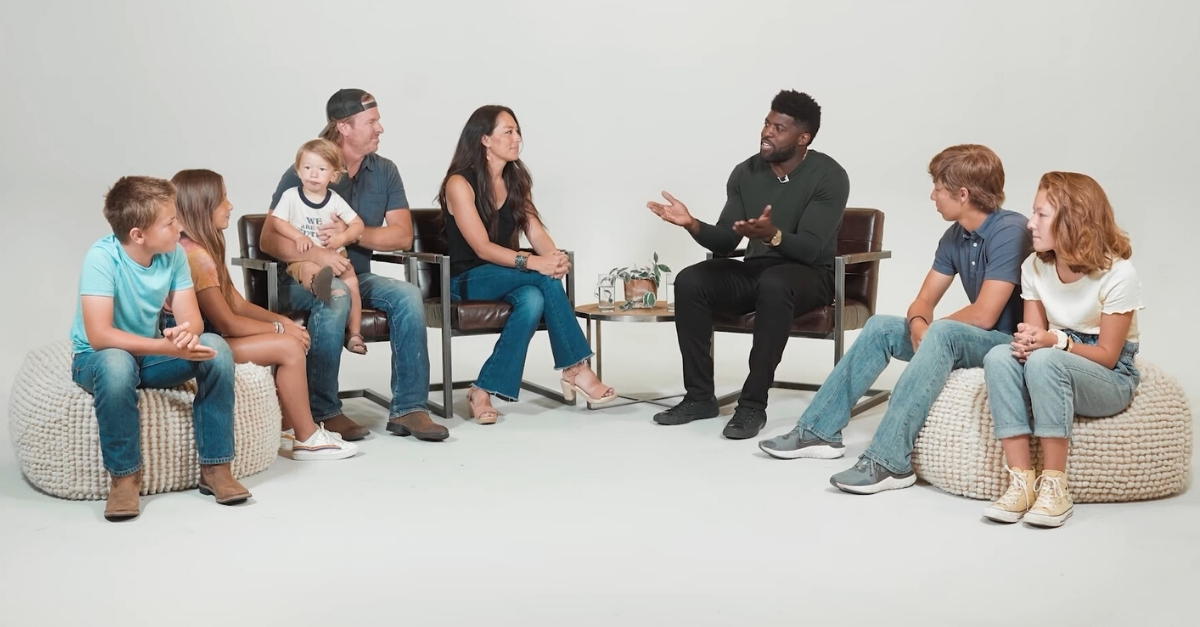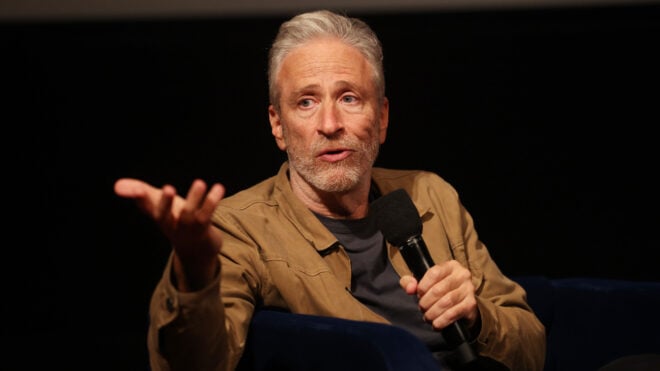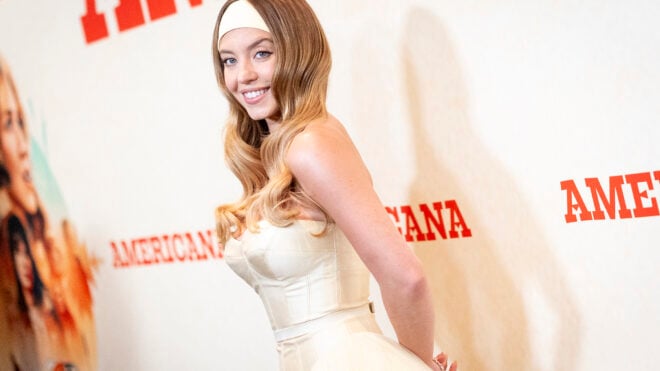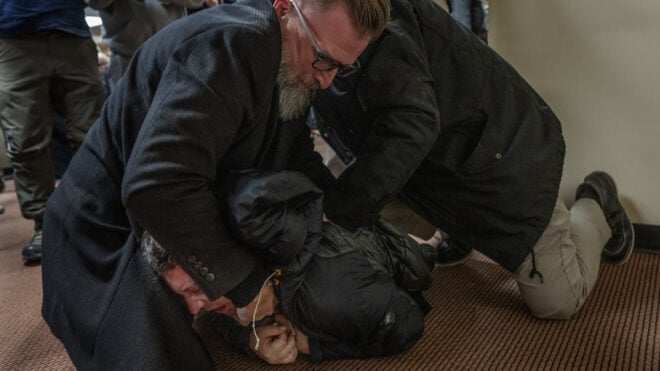
Chip and Joanna Gaines feel like family to so many people. Fans of the home improvement magnates have followed their family as they grew through their HGTV series, Fixer Upper. It's been a few years since the beloved show came to an end. Chip and Joanna are currently busy at work on a number of projects, including the Magnolia Network, set to launch later this year.
Many fans who are eagerly awaiting the Gaineses' return to TV have hoped they'd see more of their kids. Chip and Joanna recently brought the kids front and center for a YouTube sit-down. The family appeared on Emmanuel Acho's second episode of Uncomfortable Conversations With a Black Man.
During the sit-down, Chip and Joanna explain where they're at with talking to their kids about race. They also admit that they aren't quite sure how to proceed. Throughout the conversation, the couple shows both an understanding of the fact that they haven't got it all figured out and a willingness to learn. In conversations such as these, that makes all the difference.
Chip and Joanna Gaines opened themselves up to a learning experience. The couple, along with their five children, joined Emmanuel Acho for the second episode of Uncomfortable Conversations With a Black Man.
Chip and Joanna begin the nearly 10-minute-long video by explaining where they're at with talking to their kids about race in the wake of George Floyd's death and subsequent Black Lives Matter protests.
"We've been having this dialogue with our kids, and Chip, the other day, he was wanting to get a pulse on, 'What are our kids thinking about all of this?'" Joanna explains.
"And so he asked the kids a question: 'Pretend like you're at a gas station and you see a black man and a white man. Are you more threatened by either of those two men?'"
"And the kids, really quick, all said, 'No, why?' They didn't even think about that," she adds.
"Chip and I were talking and this whole idea of this colorblind thing came up and Chip said, 'I'm proud — I think our kids are colorblind.'"
"And then we started kind of pushing back on that, and I think our question to you is, I've heard other parents say that they want to raise their kids colorblind."
Joanna asks Emmanuel his opinion on whether the colorblind approach is the right way to tackle the issue.
"I think that it's best that we raise our kids to see color, because there's a beauty in color and there's a beauty in culture," he replies. He goes on to explain that because he didn't grow up around animals but knew his sister had been bitten by a dog, he couldn't tell the difference between a dog that's a threat and a dog that's a pet.
"I think that if we don't see color — if we don't expose our children to different colors, to different races — then it'll be the same thing as a white kid who becomes an adult: You won't be able to decipher the difference between a black man that's a threat and a black man that's just black," he explains.
"A black person won't be able to decipher between a white person that's a racist and a white person who's just white and may happen to be racially ignorant."
Chip then asks about how to approach people who don't see racism as an issue that needs to be solved.
Emmanuel explains that Americans need to learn that just because history is to be remembered doesn't necessarily mean it's to be celebrated.
"I think we have racism so ingrained in our culture we don't even realize we're blind to it," Emmanuel notes. He then tells a story about a woman he met on a mission who denied she needed glasses until she put them on and saw what she was missing.
"I would argue that's the same issue we have in America," Emmanuel says. "My white brothers and sisters, until they put their glasses on, they can't see all the dimensions of life."
He goes on to explain how it feels for Black kids to go to schools named after Confederate generals, or to see statues honoring those figures in their communities.
"I think in America, we have to do a better job of properly discussing and placing our heroes."
Toward the end of the video, two of the kids ask Emmanuel questions. Emmie Kay, their 10-year-old, asks Emmanuel if he is afraid of white people.
"I'm not afraid of white people — I'm cautious of white people," he explains. "I think about water and electricity: Water is necessary for life. Electricity is also necessary for life but I do understand if those two have a negative interaction, it could be lethal."
Later in the interview, Drake, their 15-year-old, asks Emmanuel if he had hope for the future. Emmanuel explains that people like Chip and Joanna having these conversations with their families and with him gives him hope. He explains how important it is to both talk and listen.
"We learn things as kids and it develops us as adults, which is why you all being here with your children is the most powerful thing, because this conversation could be life-changing — and not necessarily for their lives, but for the life of someone who looks like me."
The video has nearly 100,000 views on YouTube. Joanna and Emmanuel shared the video to Instagram, while Chip shared it on Twitter. For many, it's been powerful to see the conversation. Chip and Joanna using their immense platform to share how important it is for families to have these conversations is no small feat.
Many of the couple's fans thanked them for having these conversations publicly. They believe that Chip and Joanna are setting a good example of how to approach these issues with kids. They're also opening up a conversation in a space that is predominately white.
There were some fans of the couple who weren't happy with the video. They felt like Chip and Joanna are pandering given current events. They particularly took offense to the idea that Confederate schools and monuments need to be replaced.
Joanna has spoken about her own struggles with her racial identity in the past. Her mother is Korean, while her father is half German and half Lebanese. Joanna was bullied during her childhood for her Asian features.
"Kids in kindergarten would make fun of me for being Asian and when you're that age you don't know really how to process that; the way you take that is, 'Who I am isn't good enough,'" Joanna told Darling Magazine in 2018.
Joanna shared thoughts about coming to terms with her mixed background. "I started to think consciously about what it meant to be half-Korean," she wrote.
"I remember thinking, 'I'm either white, Korean, or both, but I've got to own this. It's me.' I started to see how beautiful my mom's culture was and how beautiful she was, and there were times when I wanted people to know she was different and she was unique. I didn't want to be embarrassed about that."




